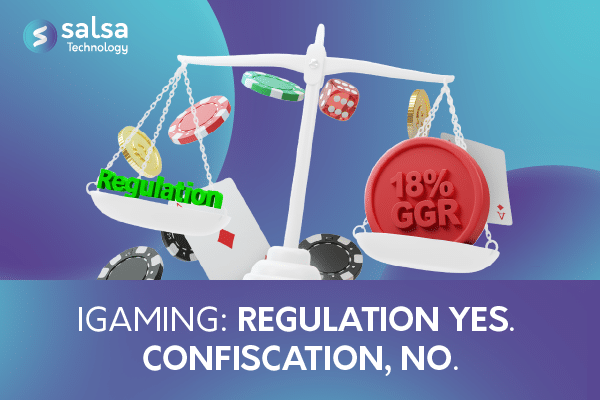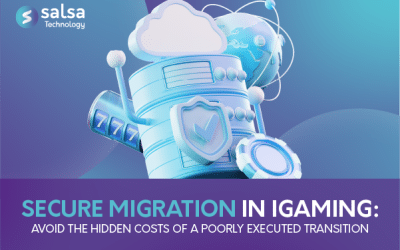iGaming: Regulation, Yes. Confiscation, No.

Salsa Technology
The iGaming Platform and Services provider of LatAm
June 11, 2025
Operating in regulated Brazil demands more than infrastructure and products. It requires an understanding of the local market, cultural adaptation, tax planning, and a clear positioning strategy. Growing with security and relevance means aligning operations, brand, and governance in a dynamic and highly demanding market.
In this article, we cover the key pillars that differentiate ordinary operators from beloved brands: tax planning, local infrastructure, branding, operational agility, and compliance. When well implemented, each of these strengthens the operator and positions them as a benchmark in the Brazilian market.
Tax structure in Brazil: real implications
Brazil’s tax structure applied to iGaming presents specific challenges and requires attention from the very start of operations. According to the Brazilian Institute for Responsible Gaming (IBJR), the fiscal environment in Brazil differs from that of more consolidated markets like the United Kingdom, requiring tailored adaptation strategies.
Therefore, it is essential to establish a robust tax planning approach that considers not only the local operation, but also international suppliers and partners. A well-structured tax alignment ensures legal security, avoids unexpected issues, and supports long-term competitiveness in a regulated environment
Physical infrastructure and local support
A prepared operator does not rely solely on technology: they build local teams in IT, legal, tax, multilingual customer service, and operational support. According to data from the SBC Summit LatAm, hybrid operational models (global + local) reduce failures by more than 35%.
Local infrastructure is not just a regulatory requirement. It ensures an efficient response to inspections from the SPA, agility in issuing tax documents, and a close relationship with Brazilian players.
Brand positioning as a strategic differentiator
According to a Nielsen study, 60% of consumers are more likely to choose brands whose values align with their own. GfK adds: a strong brand positioning is essential to justify premium prices and retain customers in the long run.
As highlighted by Lilian Carmona, Marketing Manager at Salsa: “A brand is only perceived as trustworthy when its experience, language and attitude communicate consistency at every touchpoint.”
In iGaming, that difference is evident. Brands that speak the player’s language, with authentic branding, a well-designed UX, and integrated campaigns, generate more recommendations and loyalty. Branding becomes an operational asset—not just aesthetic.
Operational agility as a competitive advantage
Time is market. According to an SBC News analysis, operators that launch quickly secure up to 20% more market share within the first six months.
Modular architectures, integrations with affiliates, payment methods, KYC systems, anti-fraud tools and CRMs—combined with efficient content delivery and regulatory readiness—are essential to accelerating entry into new markets and reducing operational failures. Our ability to ensure stability from day one is what sets operations apart, enabling growth and a long-term vision.
“At Salsa Technology, building an efficient operation goes far beyond executing processes. Our commitment is to optimise operators’ time, strengthen partnerships, and ensure that every flow—from support to integrations—is aligned with business goals. Acting closely, understanding regulatory contexts, and anticipating needs allow us to deliver not only technical solutions, but also security, clarity, and sustainable growth for all our partners,” highlights Cathiussa Canez, Retention, Operations & CS Manager.
Governance and compliance as a foundation for growth
Regulated Brazil demands more than initial compliance. It requires ongoing governance. Encrypted backups, auditable logs, tax reports, and technical support for SPA requirements are part of the routine.
Having a local team is strategic: it facilitates institutional relationships and ensures fast response to any demand. Companies with mature governance gain the trust of the market, the media, and investors.
In the view of André Neves, COO at Salsa, “What was once a differentiator is now essential. Having governance from day one reduces friction, accelerates partnerships and shows the market that you’re here to stay. Whether in Brazil or in other countries around the world.”
Conclusion: From operation to loved brand
Growing in the iGaming market requires more than just compliance. It requires structure and proper guidance. Combining tax planning, local infrastructure, strong brand positioning, operational agility and effective governance is the most solid path to transform an operation into a benchmark brand.
“Branding, campaigns, UX, technical operations, compliance and more: everything designed for realities in regulatory times. Salsa’s consulting is not just a service. It is a continuous partnership, built on years of iGaming expertise—a demonstration of the maturity of our team that stands by our clients. Our mission is to help the operator become a local reference,” reinforces Eliane Nunes, CGO of Salsa Technology.
To achieve this, Salsa Consulting offers a set of local support solutions that connect technology, operations, branding, and compliance with Brazil’s regulatory demands. With it, operators have a structured base to accelerate their entry, grow safely, and stand out in the market.



